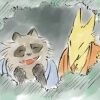🎤 Interview with satoyama note
2024年 2月 18日
We spoke with nyacchu and michi of satoyama note about making games that capture the feeling of the present-day Japanese countryside in the lovely visual novel, Satoyama Note: Natsukusa Komichi!
English (translated)
Translated by Renkon
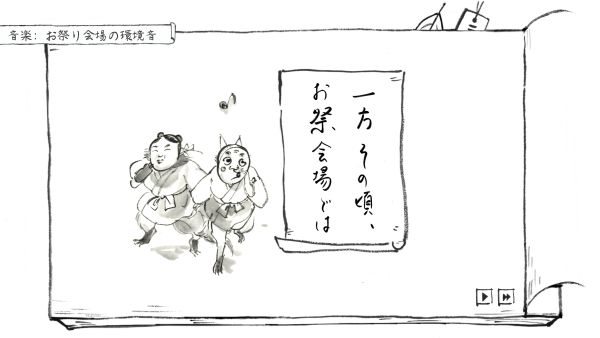
(2024) 里山のおと 夏草こみち (Satoyama Note: Natsukusa Komichi)
# Please tell us a little bit about yourselves.
We are a two-person team working under the name satoyama note. nyacchu is in charge of programming and overall management. michi is a homo sapien who is good at drawing. Incidentally, the “note” part of our name means both “note” and “sound.” (ed note: the second part of their team name in Japanese is のおと, “nooto,” which can also be read as の音 “no oto,” meaning “sound.”)
# How did you get started making games?
nyacchu: I created a game in Unity to use in my portfolio. After that, I participated several times in an event called Unity1Week, a one-week game jam on a website called Unity Room. I tried making games in a bunch of different genres, and gained experience expressing myself in a variety of ways.
michi: nyacchu encouraged me to join in. I felt that a game would give more room for expression myself than drawing a single picture.
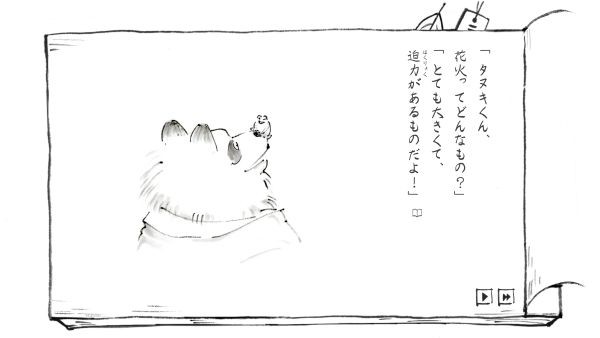
# Can you tell us about some of your favorite games and genres?
nyacchu: I like moon and other works by the same creators, the Shenmue series, and more recently, OU. I like all kinds of games regardless of genre, but I like works that emphasize having a story to tell.
michi: I recently played ゆるゆる劇場 (Yuru Yuru Gekijo, easygoing theater). I like unconventional works with a sense of gentleness.
# Please tell us about Satoyama Note: Natsukusa Komichi!
It’s a novel game about creatures that live in the satoyama. Tanuki, foxes, frogs, and humans appear in the game. Scattered throughout the story are pages from a satoyama field guide, which the players collect in order to take on the satoyama exam in the form of a quiz. That’s the gist of it. All of the pictures are hand-drawn sumi-e illustrations. The background music is a live recording of a shinobue, and the environmental sounds were recorded when visiting an actual satoyama.
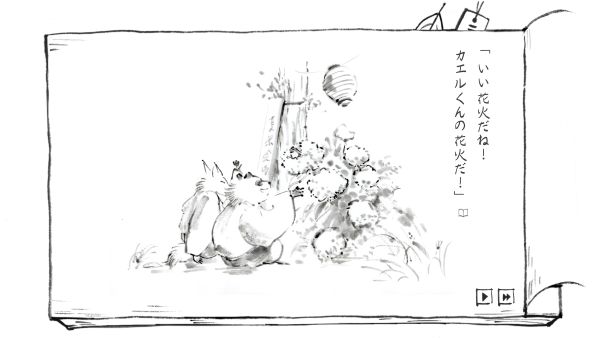
# Can you tell us about the process of making Natsukusa Komichi? Was it different from the way you approached making your other games?
For the story, we decided to portray the life and creatures of the modern countryside (satoyama). When we looked around at other games in production, we found some that portray country life as a nostalgic experience, but couldn’t find any that depict rural life in modern times.
We worked on it over weekends at a slow pace, so it took about one year to complete. We did a lot of trial-and-error along the way, including changing the game engine from Unity to Ren’Py, and switched our artwork from digital to analog illustrations.
At the same time as those changes, since we were trying to draw satoyama life, we decided to make our audio and visual materials by hand as much as possible.
As for the text, first michi would think of the story while drawing pictures, and then added in text later.
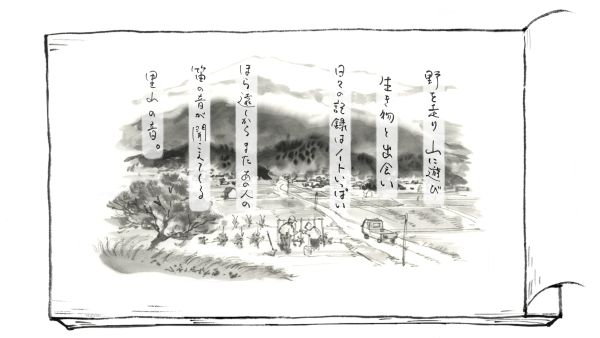
# What was your greatest influence when making Natsukusa Komichi?
The movie Pom Poko, the novel 腹鼓記 (Fukkoki) by Hisashi Inoue, the games Machi and 平成 新・鬼ヶ島 (Heisei Shin Onigashima), and the music of Shang Shang Typhoon.
# I thought the music really matched the atmosphere and was very pleasant. Can you tell us about the instrument you used and about playing this music?
It is a Japanese musical instrument called a shinobue. It is often played by children and adults alike at local shrines for lion dances and other festivals, making it the most familiar-sounding flute. My first encounter with this flute when I was put in charge of playing it for a festival.
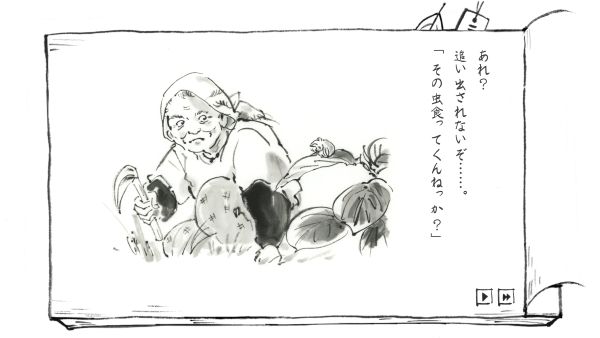
# I thought this game portrays the everyday lives of people in the countryside, filtered through the perspective of Fox and Tanuki. Did you draw on your own life experiences? If you don’t mind my asking, could you tell us about your hometowns?
michi: I spent my childhood in the Kitauonuma region of Niigata. People, nature, snow, and everything exists together there, and people are directly impacted by nature and the weather.
nyacchu: I grew up in Gunma Prefecture in a city called Maebashi. There are things like the Daruma Market and plenty of festivals, and I often visited them.
# I thought the Tanuki University exam was quite charming, and gave me an interesting opportunity to learn about life in the satoyama. How did you come up with this type of game system?
At first, we only planned to tell a story following the lives of Tanuki-kun and the other creatures, and we hadn’t planned on the Tanuki University. However, we decided to make Tanuki-kun a university student and added in the school because we thought that by having Tanuki-kun mimic humans, people would be able to observe the origins of human society and human lifestyles.
We first created a system where players would read pages of a satoyama field guide with explanations of terms and other information by clicking on words in the text. We added a quiz game in the form of the Satoyama Test to necessitate reading through the field guide. You don’t necessarily get a high score on the Satoyama Test if you are know a lot. I thought it would be interesting if people who thought things like, “I happened to see my grandpa doing this,” could get a high score.
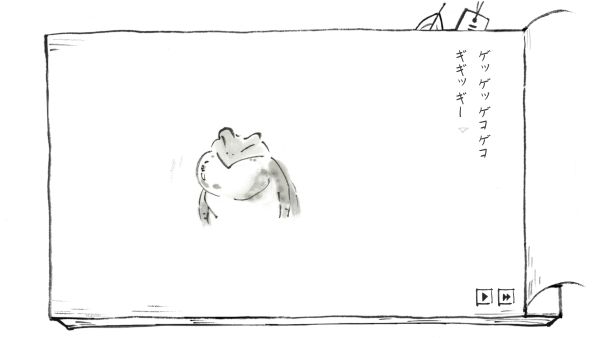
# What was the most challenging part of making Natsukusa Komichi?
As we were working on this, we realized how good it felt to combine still images and sound. So as much as possible, instead of using free assets, we went outdoors and made our own recordings. We recorded the sounds of the festival and fireworks by actually recording at to those locations, and through this we were able to create a sense of authenticity.
# I was impressed with the amount of information and the various entries and descriptions. Did you do any research when creating this game? What kind of research did you do?
For the satoyama field guide, we created it while looking up local history books and other sources. Both of us also did fieldwork in biology when we were students, so the book is based on our experiences working outdoors. One reference book we found that covered both the biological and cultural aspects of tanuki was タヌキ学入門 (Tanuki Nyuumon) by Seiki Takatsuki, and that was very useful.
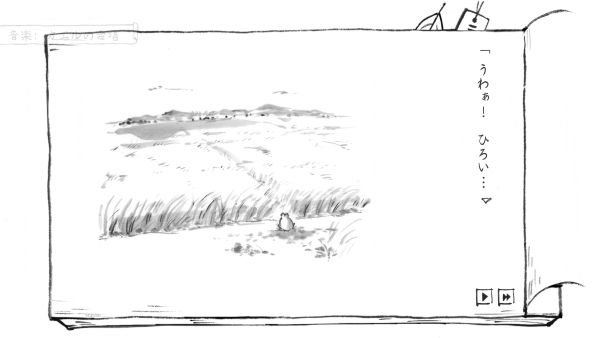
# The art style in Natsukusa Komichi uses a sumi-e art style throughout, which I thought gave the game a real sense of warmth. Can you tell us about the artwork?
I made them by grinding the ink out of inkstones and using two brushes (one with a fine tip and a large brush). The brush is thick and soft, and by applying different amounts of force, there are many ways of expressing oneself through sumi-e.
# Is there anything in Natsukusa Komichi to which you want to draw the player’s attention?
I tried to leave empty margins to allow the player to imagine the parts of the picture that are not drawn in. I think there are many pictures that are too busy, so it’s hard to see characters like Frog because they blend into the background. However, unlike humans, wild creatures are hard to see. You may catch glimpses of them in the forest, or they may run away. I tried to depict the creatures in this manner, which means that they are sometimes difficult to make out.
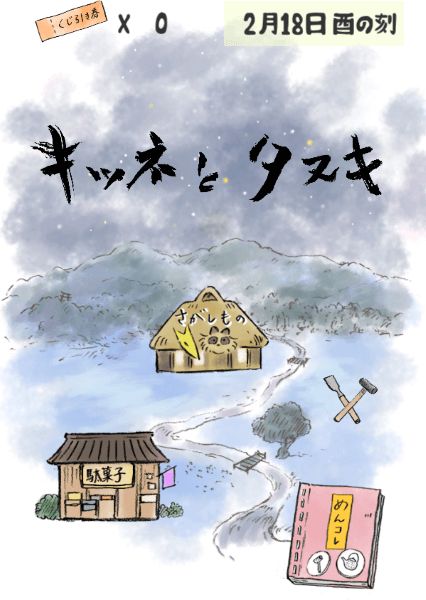
(2021) キツネとタヌキ ~探しもの見つけて、また探すの巻~ (Fox and Tanuki: Find and Seek)
# You two have released other games in the past featuring Tanuki and Fox. Can we expect to see them in another game someday?
Yes! Tanuki and Fox will also appear in our next title. We want people to pay attention to other creatures as well, so we plan to have a variety of them in our cast.
# Do you have any indie games that you’d like to shout out? What do you like about them?
I would like to recommend OU. I like games that change the way I see reality when I finish, and I believe OU does exactly that. The illustrations and the storytelling are gentle, and so I think this is a title that I can recommend to everyone, from children to adults.
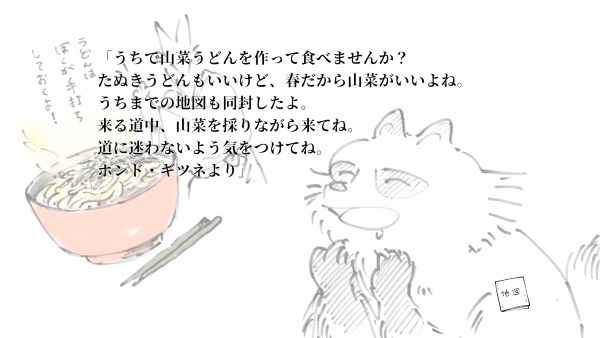
(2021) タヌキくんの春さんぽ (Tanuki's Spring Walk)
# Can you tell us about other games you worked on in the past?
We publish small games on a site called Unity Room. These are games that we made in about a week for a game jam called Unity1Week. Some of these games have rough patches, but there are several pieces that depict the satoyama in the same world as Natsukusa Komichi. You can play them for free in your browser, so please check them out.
# Can you tell us about anything you are currently working on?
We would like to not only make games, but also illustrations and miniature saijiki seasonal almanacs. This time we made a story in the summer, so we plan to create proper games for the other seasons when they occur!
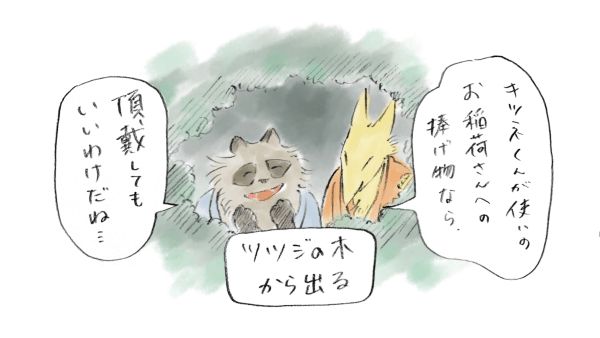
(2021) キツネとタヌキ お神酒を頂戴 (Fox and Tanuki: Please Give Us Sake)
# Do you have any messages for your players?
It is fun to look at the events, lives, and relationships with living creatures in the area we call the satoyama. In the process of making this work, we also enjoyed the process of looking into these things.
This is not a story from a long-ago time, but one that could be about these actual regions right now. There is still so much that we don’t know.
We hope that after playing this game, you will become interested in the satoyama, do some research, and go and check them out for yourself.
# Thank you for sharing your thoughts with us!
日本語

(2024) 里山のおと 夏草こみち
# お二人の自己紹介してください。
「里山のおと」というチーム名で活動している二人です。にゃっちゅは、プログラムや全体のまとめ担当。美智は、絵が得意なホモサピエンスです。ちなみに、チーム名の"のおと"には、"の音"と"ノート"の両方の意味をもたせております。
# ゲーム作りを始めたきっかけはなんですか。
にゅっちゅ:ポートフォリオとしてUnityでゲームを1つ作成してみたのがきっかけです。その後、Unity Roomというサイトで行われている、Unity1Weekという1週間でゲームを作るイベントに何回か参加しました。そこで色々なジャンルのゲームを作ってみたりして、色々な表現ができることを体験しました。
美智:にゃっちゅに誘われたのがきっかけです。一枚絵よりもゲームの方が伝えられる幅が広がると感じました。

# もしよろしければ、ご本人にとって一番好きなゲームや好きなジャンルをご紹介お願いします。
にゃっちゅ:「moon」とそのスタッフが関わる作品、「シェンムー」 シリーズ、最近では「OU」が好きです。ジャンル問わず好きですが、その作品で何が語られているかを重視しますね。
美智:最近「ゆるゆる劇場」をやりました。おだやかな方向での型破りな作品が好きです。
# この度の「里山のおと 夏草こみち」という作品についてご紹介お願いします。
里山で暮らす生き物を描くノベルゲームです。タヌキ、キツネ、カエル、ヒトが登場します。物語の文章の中には里山図鑑がちらばっていて、それを集めてクイズ形式の里山テストに挑戦する。という内容です。絵はすべて手書きの墨絵です。BGMは篠笛で生演奏したもの、環境音は実際に里山に行って録音したものです。

# 「夏草こみち」を作るときに、どのようなプロセスで作成しましたか。他のゲームを作るときと何か違いがありますか。
物語については、現代の田舎(里山)の暮らしや生き物を描くということを決めていました。今ある他のゲーム作品を見渡してみると、ノスタルジーとしての田舎暮らしを描いた作品はあるのですが、今ある地方の暮らしをそのまま描いた作品が無いなと思っていたからです。
制作期間は週末にゆっくり作業をするペースで1年ぐらいでした。途中、試行錯誤があり、ゲームエンジンをUnityからRen’Pyへ変更したり、絵をデジタルからアナログに変更したりしました。
この変更のタイミングで、里山を描くからには絵や音の素材は出来る限り手作りしようと決めました。
文章については、最初に美智さんが物語を思い描きながら絵を描き、後から文章を入れていくという順番で作りました。

# 「夏草こみち」を作成するにあたり、最も影響を受けたものは何ですか。
映画では 「平成狸合戦ぽんぽこ」、小説では「腹鼓記」(井上ひさし著)、ゲームでは「街」、「平成 新・鬼ヶ島」、音楽では「上々颱風」です。
# 作中に流れる音楽も雰囲気に合っていて楽しい気分になりました。使用した楽器やその演奏について教えてください。
篠笛という和楽器です。よく地域の獅子舞や神楽などの祭りで子供から大人まで演奏するので、最も身近なにほんの笛ですね。お祭りで笛を担当したのが出会いです。

# タヌキやキツネの視点でありながら、田舎の人間の生活が見える作品と思いました。これはご本人の経験からくるものですか。もしよろしければお二人の故郷について教えてください。
美智:新潟の北魚沼地域で幼少期を過ごしました。人も自然も雪も何もかも一緒くたに存在し、人々は自然や気象の影響を直に受けます。
にゃっちゅ:僕は群馬県の前橋という都市部で育ちました。だるま市など、お祭りはたくさんあったので、よく行っていましたね。
# 狸大学の試験という形が、とてもかわいく里山の文化を知るきっかけにもなり、興味深いと感じました。このようなゲームシステムに至った経緯について教えてください。
最初はタヌキくんをはじめ、生物たちの暮らしを追う物語のみで、狸大学は無い予定でした。しかしタヌキくんを大学生にし、タヌキに人真似をさせることで、人の社会や暮らしの成り立ちを客観視してもらえるんじゃないかと思い大学を付け加えました。
文章中の文字を選択すると用語解説などが書かれた里山図鑑が読めるというシステムは最初に作成していました。この図鑑を読むことに必要性を持たせたいと思い、里山テストという形でクイズゲームを追加しました。里山テストは知識がある人が高得点とは限りません。たまたまおじいちゃんがこうやってるのを見ていた、とかそうゆう人が高得点を取れるところが面白いかなと。

# 「夏草こみち」を作成するにあたり最も挑戦したことなどはありますか。
作っていくうちに静止画と音が組み合わさる気持ちよさに気付きました。そこでなるべくフリー素材を使わずに野外に録音しに行きました。祭りや花火の音も実際に現地で録ったので臨場感が出せたと思います。
# 「夏草こみち」は、たくさんの情報とその説明文も魅力的でした。このゲームを作るにおいて何か調べたり学んだりしたことはありますか。どのように調査しましたか。
里山図鑑については、地方の歳時記など調べながら作りました。また2人とも学生時代に生物学系のフィールドワークをしていたので野外での経験が元となっています。参考書籍を1つ挙げますと、タヌキの生物面、文化面の両方について書かれた「タヌキ学入門」(高槻 成紀著)はとても参考になりました。

# 「夏草こみち」は、墨絵で統一され、それが何か温かみのようなものを感じました。どういう風に描いていますか。
硯で墨をすり、筆二本(細筆、大筆)で描いています。水墨画の筆は太く柔らかく、力の入れ具合で表情豊かな表し方ができます。
# 「夏草こみち」において、プレイヤーに伝えたいこだわったポイントなどありますか。
描かれていないところも想像できるような余白のある手描き絵にしました。カエルくんなどの生き物のキャラクターが背景に紛れて視認しづらい絵も多々あると思います。しかし野生生物は人とは違い見えづらいものです。林の中から体の一部だけ見えていたり、逃げてしまったり。そうゆうものをあえてそのまま見えづらく描きました。

(2021) キツネとタヌキ ~探しもの見つけて、また探すの巻~
# 「夏草こみち」以外にもタヌキ君やキツネ君が登場するゲームを公開されていますが、またいつか別のゲームへの登場を期待してもいいですか。
はい!次回作にもタヌキくんとキツネくんは登場します。他の生き物にも注目してほしいので、いろいろな生き物を登場させる予定です。
# おすすめのインディーゲームはありますか。おすすめのポイントも教えてください。
「OU」をおすすめしたいです。僕はプレイを終えた後に現実の見え方が変わるような作品が好きなのですが、これはそういった作品だと思います。絵や語り方がやさしいので、こどもからおとなまですべての人にすすめられる作品だと思います。

(2021) タヌキくんの春さんぽ
# もしよろしければ、これ以外に作成したゲームについてご紹介お願いします。
Unity Roomというサイトで、小さな作品を公開しています。これらはUnity1Weekというゲームジャムで、ほぼ1週間で作った作品です。作りが粗いところはありますが、今作と同じ世界観で里山を描いた作品がいくつかあります。ブラウザ上で無料でプレイできますので、よかったら遊んでみてください。
# 今はどのようなプロジェクトを進めていますか。今作っているゲームや絵画、活動をもしよろしければご紹介お願いします。
ゲームに限らず、イラストや歳時記ミニブックなども作りたいです。今回は夏のお話だったので、その時その時の四季にちなんだゲームも制作する予定です!

(2021) キツネとタヌキ お神酒を頂戴
# プレイヤーの皆さんへ何かメッセージがあれば一言お願いします。
里山と呼ばれている地域の行事や、生活、生き物との関係を見ていくのは面白いです。今作を作る過程で、僕らも楽しみながら調べました。
これは昔話ではなく、今も実際に地方で行われていることなのです。まだまだ知らないことがいっぱいです。
今作をプレイしたあと、里山に興味を持って調べたり、出かけてみたりするきっかけになればうれしいですね。
# この度はインタビューにご協力いただき誠にありがとうございます。
